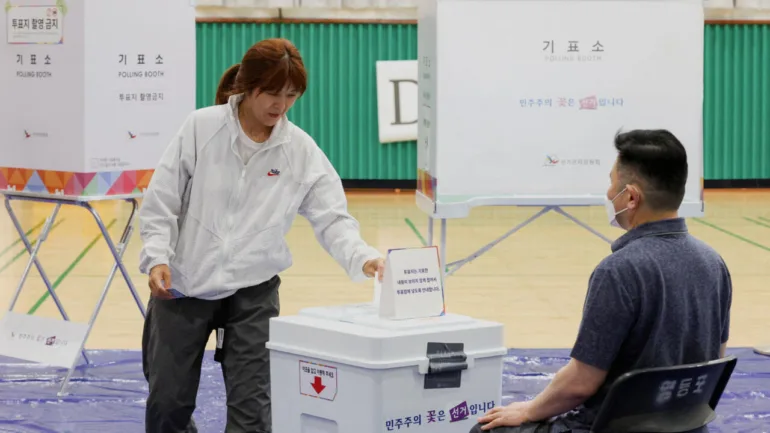South Koreans headed to the polls on Tuesday in a snap presidential election, marking the culmination of six months of political upheaval following former President Yoon Suk Yeol’s controversial declaration of martial law.
In the early hours of the morning, a small group of elderly voters lined up at a polling station in Seoul’s Munrae-dong district, casting their ballots as polls opened at 6:00 a.m. local time (2100 GMT).
“We came early with hope that our candidate wins. This is the most important election,” said 80-year-old Yu Bun-dol, who told AFP she was voting for the conservative People Power Party (PPP) candidate.
According to the National Election Commission, over a third of registered voters had already cast their ballots during a two-day early voting period last week.
Liberal frontrunner leads amid conservative crisis
Liberal candidate Lee Jae-myung holds a commanding lead in the race, with the latest Gallup Korea poll placing him at 49 percent support. His main challenger, conservative Kim Moon-soo of the PPP—Yoon’s former party—trails at 35 percent.
Political analysts say the election is widely seen as a referendum on the Yoon administration, whose downfall has shaken the foundations of South Korea’s conservative movement.
“The martial law declaration and the impeachment crisis not only alienated moderates but deeply fractured the conservative base,” said Kang Joo-hyun, a political science professor at Sookmyung Women’s University.
Yoon became the second consecutive conservative president to be removed from office after deploying armed soldiers to the National Assembly—an act that sparked nationwide outrage and led to his impeachment. His removal left South Korea without a clear leader during the early months of U.S. President Donald Trump’s second term.
Adding to conservative woes, PPP candidate Kim failed to secure an alliance with third-party candidate Lee Jun-seok of the Reform Party, risking a further split in the right-wing vote.
A ‘turning point’ for the nation
“Conservative politics in South Korea used to be associated with stability and competence,” said Kang Won-taek, a professor at Seoul National University. “That image has been seriously damaged.”
With Lee’s Democratic Party already holding a parliamentary majority, analysts warn that the conservative bloc could face prolonged political exile unless it resolves its internal divisions.
South Korean presidents serve a single five-year term. In a regular election, there is a transition period, and the new president assumes office at midnight following the previous leader’s last day. But in this snap vote, the winner will be sworn in immediately after the National Election Commission certifies the results.
After months of turmoil and a succession of acting presidents, many South Koreans are eager for stability.
In Gwangju, a city symbolic of South Korea’s pro-democracy movement, 65-year-old retired teacher Jung Se-yoon described the election as a critical juncture.
“This is a turning point,” Jung said. “If we miss this opportunity, it could take years for the country to recover.”
Voter turnout expected to be high
Experts predict strong voter turnout, driven by the sense of urgency surrounding the election.
“The question is not whether Lee Jae-myung will win, but whether he can surpass the 50 percent mark,” said Bae Kang-hoon, co-founder of the political think tank Valid. “If he does, it would give him a clear mandate and significant political momentum.”
As the polls close and ballots are counted, South Korea stands at a crossroads—grappling with the consequences of authoritarian overreach and looking to chart a new course forward.
AFP


